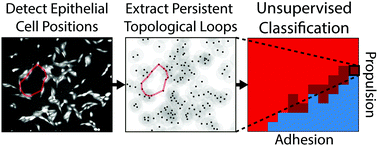Topological data analysis of collective and individual epithelial cells using persistent homology of loops†
Abstract
Interacting, self-propelled particles such as epithelial cells can dynamically self-organize into complex multicellular patterns, which are challenging to classify without a priori information. Classically, different phases and phase transitions have been described based on local ordering, which may not capture structural features at larger length scales. Instead, topological data analysis (TDA) determines the stability of spatial connectivity at varying length scales (i.e. persistent homology), and can compare different particle configurations based on the “cost” of reorganizing one configuration into another. Here, we demonstrate a topology-based machine learning approach for unsupervised profiling of individual and collective phases based on large-scale loops. We show that these topological loops (i.e. dimension 1 homology) are robust to variations in particle number and density, particularly in comparison to connected components (i.e. dimension 0 homology). We use TDA to map out phase diagrams for simulated particles with varying adhesion and propulsion, at constant population size as well as when proliferation is permitted. Next, we use this approach to profile our recent experiments on the clustering of epithelial cells in varying growth factor conditions, which are compared to our simulations. Finally, we characterize the robustness of this approach at varying length scales, with sparse sampling, and over time. Overall, we envision TDA will be broadly applicable as a model-agnostic approach to analyze active systems with varying population size, from cytoskeletal motors to motile cells to flocking or swarming animals.

- This article is part of the themed collection: Active Matter


 Please wait while we load your content...
Please wait while we load your content...